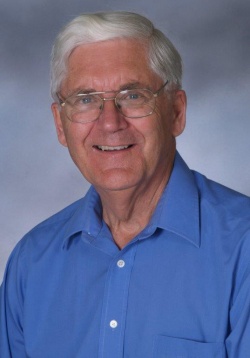Michael Hugh Dickson, professor emeritus in the Horticulture Section of the School of Integrative Plant Science, died March 28 at age 85.
Dickson gained fame for his work as a breeder of orange cauliflower, a variety high in beta carotene, which is used by the human body to make the essential nutrient vitamin A.
“Although Mike was known worldwide for his cauliflower work, he did so much more,” said Steve Reiners, professor and chair of the Horticulture Section. “He was a great collaborator; he worked with plant pathologists to develop disease-resistant snap beans and cabbage and he worked with entomologists to develop insect-resistant crucifers. He also developed beans that grew better in our cool New York soils.”
Dickson was born in London, England, April 2, 1932, and lived the first three years of his life in Egypt, where his father, Hugh Dickson, was a botanist working on King Tut’s tomb. He earned a bachelor’s degree from McGill University in Montreal in 1955, and a master’s and doctorate in plant breeding from Michigan State University in 1956 and 1958, respectively.
He joined the faculty at Ontario Agricultural University in Guelph, Ontario, before he was hired by Cornell as a research professor at the New York State Agricultural Experiment Station in Geneva, New York, in 1964. He led the bean and crucifer breeding programs there until 1995, when he retired.
Dickson began working on orange cauliflower in 1981, when fellow researchers forwarded him a cauliflower mutant that was smaller and less tasty than white cauliflower, yet was packed with beta carotene that provided its orange hue. Over the next eight years, Dickson crossbred the orange mutant with white cauliflower until he found the right combination of size, taste and color in 1989, which he released to seed companies. The orange clone called “Cheddar” was made public in 2004.
The development of these crops is important because vitamin A deficiency is common in developing countries and can lead to compromised immune systems and blindness in children.
His research led to a great deal of useful germplasm (genetic resources such as seeds or tissues) that has been widely used – some of which is still used today – by vegetable-seed companies.
Dickson was a fellow of the American Horticultural Society.
“Along with being a prolific writer with close to 150 publications, he was an excellent mentor and trained dozens of graduate students,” Reiners said. “Perhaps most importantly, he was a caring and kind person who went out of his way to help everyone.”
He is survived by his wife, Jean, three daughters and four grandchildren.
A celebration of his life will be held at the Presbyterian Church, 24 Park St. in Geneva on April 7 at 1:30 p.m. Memorial contributions may be sent to the Geneva Public Library, 244 N. Main St., Geneva, N.Y. 14456, or the Presbyterian Church in Geneva.





